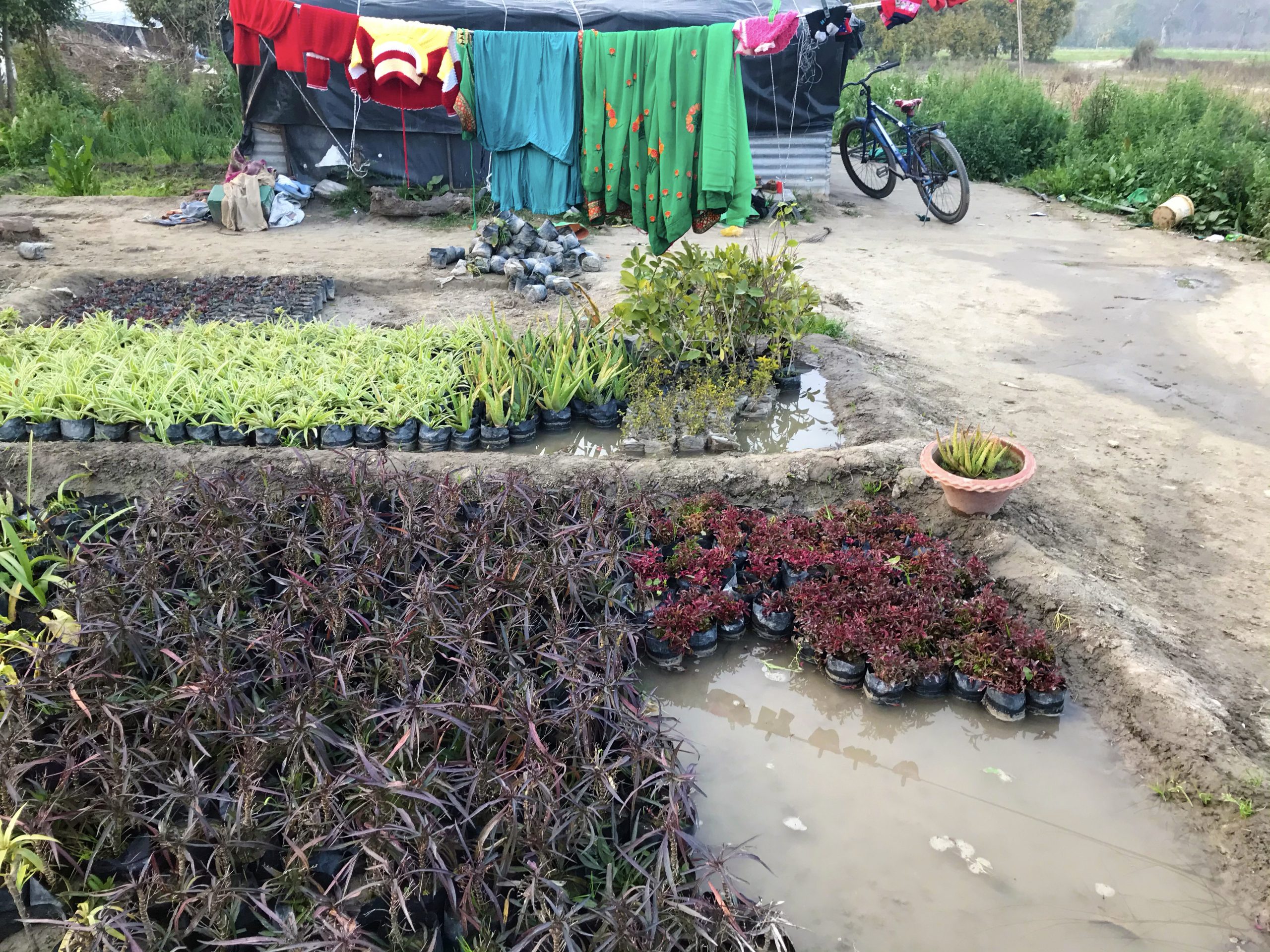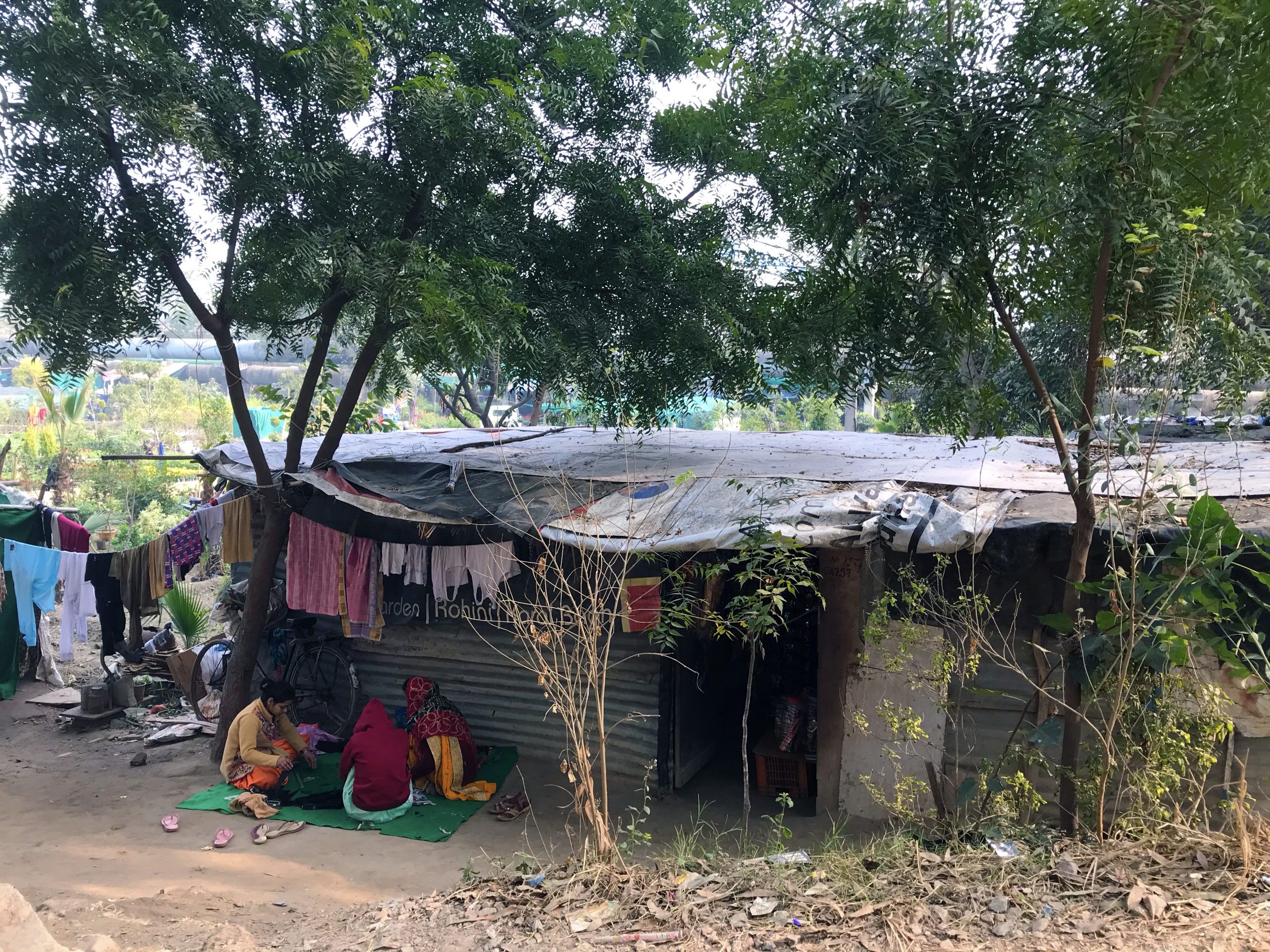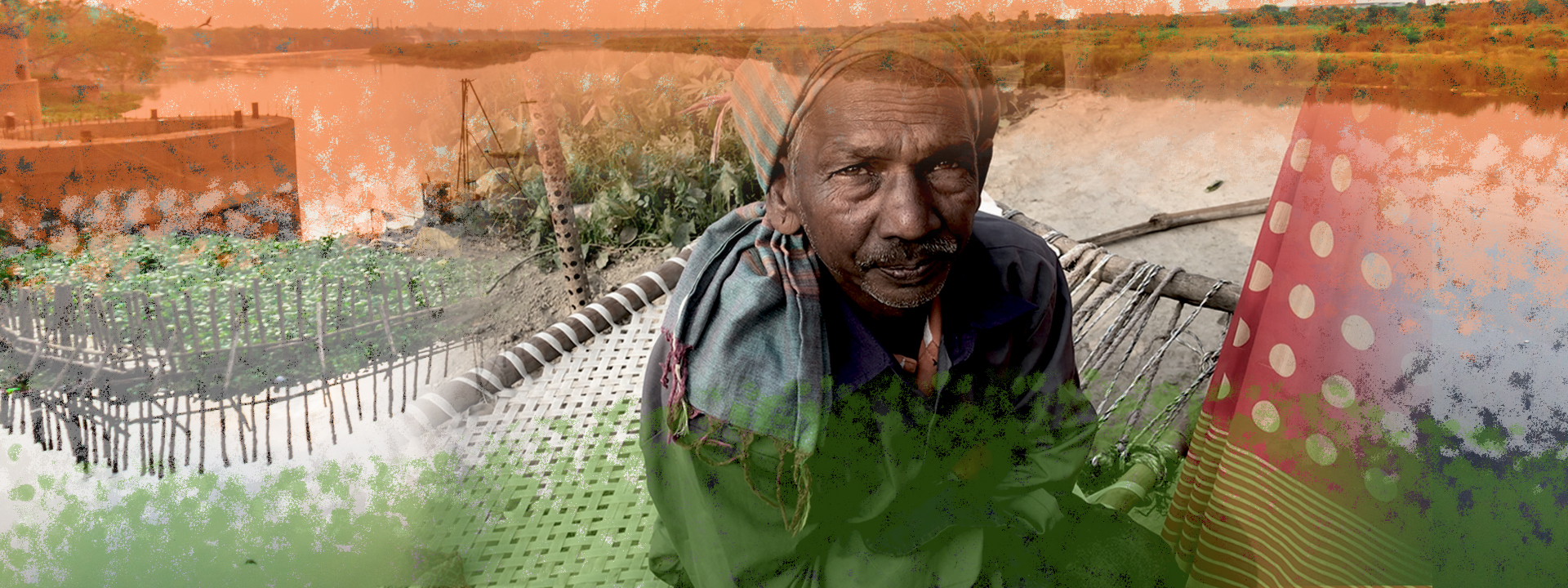Delhi’s iconic Signature bridge spans the Yamuna river, the longest tributary in India. On the bridge, motorists cruise on an eight-lane carriageway between the Indian capital’s north and northeast areas. In the shadow of the bridge, though, time stands still for the farmers who own land and who have been growing fruits and vegetables, flowers, and ornamental plants in the area since the 1950s.
During the COVID-19 pandemic, the farmers struggled to find a market for their fresh produce and to make ends meet. “Nobody allowed us to go to the market to sell anything,” said Bawari Das. “We were not even allowed to ride our cycles to take the produce to the market.”
Das has been living in the area for 30 years and supports his family of nine from his farm measuring 3 bigha (about 7,500 square meters). He had to feed his family’s harvest to the buffaloes.
In addition, the farmers were threatened with eviction by the authorities. The government sent bulldozers and destroyed their meager livelihoods. Rahul* lives near the bridge in his makeshift house of tarpaulin and tin sheets. He can’t pinpoint the exact date that he moved there from Uttar Pradesh in northern India “about 8 or 10 years ago.” Rahul plants and sells the flowering and ornamental plants that he grows in a 1,000-square-meter nursery beside his house. He also works as a gardener in a nearby apartment building.
His once-lush nursery now lies in ruins. It is planted with a few straggly plants and littered with broken pots. Rahul said, “The officials came with a huge police force and 5 to 6 tractors and bulldozers. They have threatened us that they will come again.” In the face of such uncertainty, he is unable to plant anything in his nursery.

Toxic metals
What led to such a grim situation?
“The farmers have been asked many times to leave the area, but never before has the government taken such harsh steps,” said Bhim Singh Rawat, associate coordinator of the NGO South Asia Network on Dams, Rivers, and People. “The National Green Tribunal’s 2018 verdict seems to have an instrumental role in what’s happening now.”
A 2018 report found that the vegetables grown in the Yamuna floodplain of Delhi contain high levels of toxic metals. As the Yamuna river flows from Haryana in north-central India to Delhi, it is exposed to the indiscriminate dumping of sewage and industrial waste, which has increased the toxicity of the river. Following the report, the court ordered the the Delhi Development Authority (DDA) to stop all farming activities in the area by 2020.
“Farmers are essential to the sanctity of this region and have worked for years to make this region farmable. Now the authorities want to take it away from us and build an artificial park,” Rawat said.
The region is prone to heavy floods during the monsoon, and residents move to the upland every season. Along with wreaking destruction in the area, the floods also bring nutrient-rich soil. The farmers here have adapted to the patterns of the floods and farm vegetables and ornamentals.
“If this flood-prone area is given for the construction of a park, it would incur more loss than profit,” said Dalbir Singh, vice president of the Delhi Peasants Cooperative Multipurpose Society (DPCMS), which was granted a lease in 1949 to farm on the floodplain of Yamuna river.
“The farms and the park can co-exist,” said Swati Janu, founder of Social Design Collaborative. “We need to find a sustainable solution in our urban planning models.”
The architect and writer believes that the “upcoming Delhi Master Plan 2041 has immense scope to consider the livelihoods of the farmers in its vision of the capital. The city also belongs to them. Instead of simply removing them, they need to be integrated as important stakeholders in the development of the city,” she said.
An elusive dream
Diwan Singh would agree. The park, as planned “by [ecologist and retired professor] Professor C. R. Babu has huge scope of manual work initially and maintenance task afterwards,” said the activist and convener of Natural Heritage First, a group of concerned citizens. “These affected farmers and farm workers deserve to be engaged and employed in these activities.”
According to Singh, the farmers have provided the people of Delhi with fruits, vegetables, and flowers for decades. They have the requisite farming skills and experience to contribute to the floodplain restoration projects being proposed by DDA.
That dream of peaceful co-existence remains elusive. In August 2020, the authorities came to the area to destroy the farms for the first time. At the time, the number of COVID-19 cases in Delhi was at a peak. After August, DDA officials again came with bulldozers and repeated the destruction. On both occasions, DDA did not give the farmers prior notice or provide time to evacuate their houses.
“They come and start to destroy everything,” Prabhavati*, a farmer who resides in the area, said. “Our kitchens are destroyed; our food is run under the tractors.”
Vijay Singh takes care of the plants in a lot measuring 50 bigha. The lot’s owner pays him a monthly salary. Singh said, “The last time DDA asked us to move away from the location was in December. Before this they came twice in the summer of 2020. They want to replace the nurseries with trees.” He heard people say that DDA would come again around Holi. This year, India’s festival of colors takes place from March 28 to 29.

A long-running dispute
DDA has tweeted about ten projects that are underway on the Yamuna floodplain to rejuvenate the area. The projects include creating wetlands and planting riverine flora and trees such as Indian blackberry and guava.
The farmers are caught in a legal dispute that began in 1949, two years after the India attained its independence. The then prime minister Jawaharlal Nehru allocated the Yamuna Khadar region to the farmers on a lease in 1949. Due to institutional and communication issues, the mostly uneducated farmers failed to renew the lease in1972. (Some reports said the DDA terminated the lease in 1966.)
“For years, we have been pleading with DDA to renew our lease, but it has never considered our pleas,” Baljeet Singh Chauhan, president of DPCMS, told the media. “We have never obstructed any public welfare project, be it a railway line, road, bridge, power line, drinking water pipeline, or any other public utility.”
Since the farmers could not renew the lease, this issue took a form of a legal dispute between DDA and the farmers, which began in 2000. “We are ready to pay the fees to continue farming, and we fought for our rights,” said Singh. “Unfortunately, we lost the case in the Supreme Court.”
The farmers who cultivate the land in the region pay an annual fee to use it, said Amarpal*, another farmer. “We have rejuvenated, leveled, and taken care of this land. Why are we still called encroachers?” he said. Amarpal lost plants and pots worth 2.5 lakhs (US$3,450) when DDA arrived with tractors and bulldozers in August 2020.
There is no official count of people living in the region. “This region hosts about 3,000 jhuggis (slum dwellings), with more than 5,600 people,” said Amarpal. “I know the number because we arrange a huge bhandara (feast) every year, and this is the number of people who come to eat.”
Vijay said, “We do not know where to go and what else to do. We do not have enough money so that we can go somewhere else or start something new. This is all that we have.” While the government is evacuating the farmers, there is no compensation, help, guarantee, or alternative work offered to the farmers.
“We are not obstacles,” said Singh. “We can be part of the development project. We are ready to adapt and adopt better farming practices, but nobody listens to us.” ●
*Editor’s note: Prabhavati, Rahul, and Amarpal don’t use their last names.
Monika Mondal is an independent journalist who focuses on the environment, agriculture, and green growth. Follow her work at http://monikamondal.contently.com/.



















